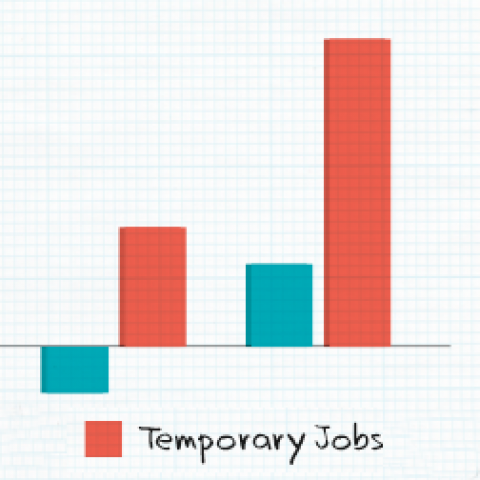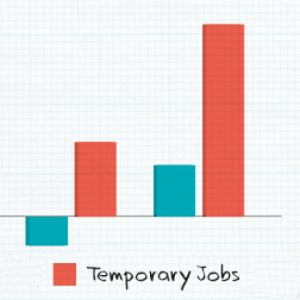
3 stinging graphs that cut Stephen Harper’s million jobs problem wide open
First, Tim Hudak had a “Million Jobs Plan” problem. he Conservative Party recently launched the “We’re better off with Harper” campaign with the claim that “with over one million net new jobs created in the recovery, Canada’s economy is on the right track – thanks to the strong leadership of Stephen Harper and Canada’s Conservatives.” […]
First, Tim Hudak had a “Million Jobs Plan” problem.
he Conservative Party recently launched the “We’re better off with Harper” campaign with the claim that “with over one million net new jobs created in the recovery, Canada’s economy is on the right track – thanks to the strong leadership of Stephen Harper and Canada’s Conservatives.”
The number in that claim is carefully chosen, and taken in isolation is factually correct. In the five years of recovery from June 2009 to June 2014, total employment indeed rose by 1,091,400 jobs.
But if we do the count from June 2008, before the onset of the recession and the big job losses it caused, the increase in employment to date has been a more modest 753,000 jobs. And the national unemployment rate in June 2014 was, at 7.1%, still significantly higher than the average of 6.0% in 2007 and 6.1% in 2008.
Most importantly, Canada’s employment rate – the proportion of the working-age population with a job – is still well below pre-recession levels.
– See more at: http://www.pressprogress.ca/en/blog/fact-check-putting-conservatives-mil…
The Conservative Party recently launched the “We’re better off with Harper” campaign with the claim that “with over one million net new jobs created in the recovery, Canada’s economy is on the right track – thanks to the strong leadership of Stephen Harper and Canada’s Conservatives.”
The number in that claim is carefully chosen, and taken in isolation is factually correct. In the five years of recovery from June 2009 to June 2014, total employment indeed rose by 1,091,400 jobs.
But if we do the count from June 2008, before the onset of the recession and the big job losses it caused, the increase in employment to date has been a more modest 753,000 jobs. And the national unemployment rate in June 2014 was, at 7.1%, still significantly higher than the average of 6.0% in 2007 and 6.1% in 2008.
Most importantly, Canada’s employment rate – the proportion of the working-age population with a job – is still well below pre-recession levels.
– See more at: http://www.pressprogress.ca/en/blog/fact-check-putting-conservatives-mil…
The Conservative Party recently launched the “We’re better off with Harper” campaign with the claim that “with over one million net new jobs created in the recovery, Canada’s economy is on the right track – thanks to the strong leadership of Stephen Harper and Canada’s Conservatives.”
The number in that claim is carefully chosen, and taken in isolation is factually correct. In the five years of recovery from June 2009 to June 2014, total employment indeed rose by 1,091,400 jobs.
But if we do the count from June 2008, before the onset of the recession and the big job losses it caused, the increase in employment to date has been a more modest 753,000 jobs. And the national unemployment rate in June 2014 was, at 7.1%, still significantly higher than the average of 6.0% in 2007 and 6.1% in 2008.
Most importantly, Canada’s employment rate – the proportion of the working-age population with a job – is still well below pre-recession levels.
– See more at: http://www.pressprogress.ca/en/blog/fact-check-putting-conservatives-mil…
The Conservative Party recently launched the “We’re better off with Harper” campaign with the claim that “with over one million net new jobs created in the recovery, Canada’s economy is on the right track – thanks to the strong leadership of Stephen Harper and Canada’s Conservatives.”
The number in that claim is carefully chosen, and taken in isolation is factually correct. In the five years of recovery from June 2009 to June 2014, total employment indeed rose by 1,091,400 jobs.
But if we do the count from June 2008, before the onset of the recession and the big job losses it caused, the increase in employment to date has been a more modest 753,000 jobs. And the national unemployment rate in June 2014 was, at 7.1%, still significantly higher than the average of 6.0% in 2007 and 6.1% in 2008.
Most importantly, Canada’s employment rate – the proportion of the working-age population with a job – is still well below pre-recession levels.
– See more at: http://www.pressprogress.ca/en/blog/fact-check-putting-conservatives-mil…
The Conservative Party recently launched the “We’re better off with Harper” campaign with the claim that “with over one million net new jobs created in the recovery, Canada’s economy is on the right track – thanks to the strong leadership of Stephen Harper and Canada’s Conservatives.”
The number in that claim is carefully chosen, and taken in isolation is factually correct. In the five years of recovery from June 2009 to June 2014, total employment indeed rose by 1,091,400 jobs.
But if we do the count from June 2008, before the onset of the recession and the big job losses it caused, the increase in employment to date has been a more modest 753,000 jobs. And the national unemployment rate in June 2014 was, at 7.1%, still significantly higher than the average of 6.0% in 2007 and 6.1% in 2008.
Most importantly, Canada’s employment rate – the proportion of the working-age population with a job – is still well below pre-recession levels.
– See more at: http://www.pressprogress.ca/en/blog/fact-check-putting-conservatives-mil…
Now, Stephen Harper has landed in a bit of trouble with his claim that “one million net new jobs” have been created since the recession.
This well-worn line by Harper and cabinet ministers now underpins the Conservative Party’s new “We’re better off with Harper” campaign.
It should have an asterisk next to it, though.
There’s a reason why the Conservatives use June 2009, a low point for the Canadian economy, as their starting point, writes economist Andrew Jackson in a new analysis of Statistics Canada’s labour force data.
If you look at the stats before the onset of the recession in June 2008 and the big job losses it caused, you get a more fulsome — and accurate — picture of where Canada stands, explains Jackson, a senior advisor at the Broadbent Institute.
The increase in employment is a “more modest 753,000 jobs.” What’s worse? There are actually 638,810 missing jobs in Canada since June 2008.
That’s because Canada’s employment rate — the proportion of the working-age population with a job — “is still well below pre-recession levels,” explains Jackson. The missing jobs number, though, doesn’t really work as a rallying point for your economic stewardship.
This is what the real Conservative jobs record looks like in three graphs:



Our journalism is powered by readers like you.
We’re an award-winning non-profit news organization that covers topics like social and economic inequality, big business and labour, and right-wing extremism.
Help us build so we can bring to light stories that don’t get the attention they deserve from Canada’s big corporate media outlets.
Donate



